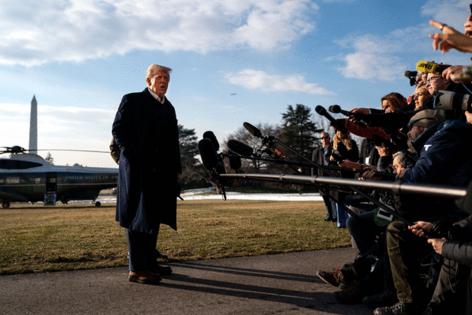Commentary: Donald Trump's first week signals a coercive, not cooperative foreign policy
Published in Op Eds
Donald Trump has already issued a slew of dramatic proclamations, but it isn’t yet clear how many will come to fruition. In foreign policy, at least, the message is crystal clear, even if the impact isn’t yet.
That message is: Do what I demand or face the consequences. Trump has demonstrated that he intends to threaten his way to his foreign policy goals. Rather than directing his ire at recognized adversaries like Russia, North Korea or China, he has focused mostly on strongarming our friends.
Take tariffs. Just before the election, Trump vowed that one of his first executive orders would levy a 25% tariff against our neighbors and biggest trading partners, Canada and Mexico. Dozens of executive orders later, that hasn’t happened. Instead, he has threatened to do so in February “because they’re allowing vast numbers of people … and fentanyl to come in,” according to Trump. I suspect he understands that 25% tariffs on goods from these two countries would raise costs, worsen inflation and hurt Americans, so he’s hoping the threat is enough to secure concessions without having to follow through.
The targeted countries are already planning retaliatory action against U.S. industries. Canada is reportedly preparing tariffs against red state industries so that Trump’s supporters feel the squeeze. Whether this rhetoric leads to a trade war, renegotiated trade terms or other concessions is so far unclear. But world leaders must understand on some level that caving to a bully isn’t often the foundation of a harmonious relationship.
Before the election, Trump claimed that he would levy 60% tariffs on all Chinese imports as well, but that hasn’t materialized either. This week, Trump said he’s considering a 10% tariff on Chinese goods, for China’s complicity in the fentanyl trade. But Trump later linked the threat to a change in TikTok ownership. He signed an executive order to postpone the TikTok shutdown, required by law unless TikTok’s parent company sells the app’s U.S. business to keep it out of reach of the Chinese government. Trump has suggested that he won’t levy the tariff if Elon Musk buys the app or someone else does and “give(s) half to the United States of America.” It’s a rich irony that Trump is seeking to control something that American lawmakers didn’t want in the hands of the Chinese government because it can be used to manipulate public opinion.
Trump has threatened tariffs on the European Union, too, unless they buy more American oil, which is just one part of his fossil-fuel-first approach. In addition to promising to “drill, baby, drill,” he declared a national energy emergency and promised a wide range of actions not only to boost oil and gas production but also to intentionally obstruct renewable energy projects. Since no one else is abandoning the renewable energy revolution, the rest of the world will now look to China to help meet that demand.
Trump’s message to the world more broadly is that the United States is no longer a cooperative member of the global community, on climate or other shared threats. He again withdrew from the Paris Climate Agreement, making the United States one of only four countries that doesn’t take part. He also withdrew from the World Health Organization (WHO), just as the highly contagious H5N1 strain of bird flu is spreading across the United States. This won’t only hurt America but will harm global efforts to combat shared health challenges since the United States funds about 18% of the WHO budget. The COVID pandemic should have been sufficient evidence that walls and troops do little to prevent disease from crossing our borders, but Trump still blames the international organization for his own failures to manage the COVID crisis here at home.
Trump has doubled down on his threat to take back the Panama Canal too. The United States built it in the early 1900s but gave control back to Panama in 1999, in accordance with a 1977 treaty. What exactly he means by taking it back is unclear, but he has declined to rule out doing so by force. Trump claims that American ships are being overcharged and that China controls it. In reality, operating costs have increased in recent years due to drought, and a Hong Kong-based firm has a lease to manage ports at the canal’s two ends. In an apparent effort to appease Trump, Panama has begun an audit of the port company.
The message from China, our biggest global adversary, to the rest of the world this week was very different. China’s vice premier spoke to the World Economic Forum in Davos of “jointly promot(ing) universally beneficial and inclusive economic globalization” and the need to find “a win-win” solution to its challenges. You can imagine which message is going to resonate more with the rest of the world.
____
Elizabeth Shackelford is senior policy director at Dartmouth College’s Dickey Center for International Understanding and a foreign affairs columnist for the Chicago Tribune.
___
©2025 Chicago Tribune. Visit at chicagotribune.com. Distributed by Tribune Content Agency, LLC.




























































Comments